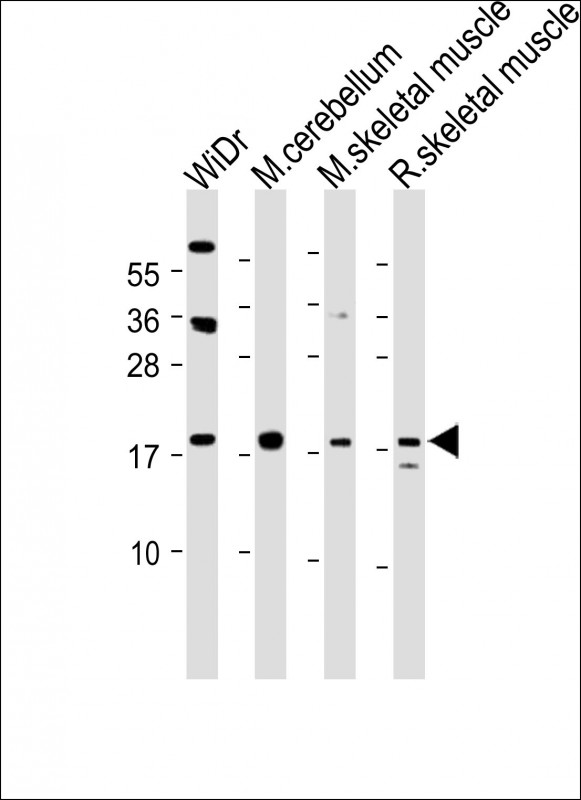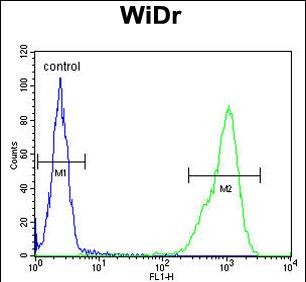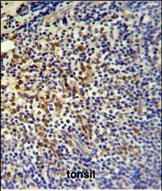


| WB | 咨询技术 | Human,Mouse,Rat |
| IF | 咨询技术 | Human,Mouse,Rat |
| IHC | 1/100-1/500 | Human,Mouse,Rat |
| ICC | 技术咨询 | Human,Mouse,Rat |
| FCM | 1/10-1/50 | Human,Mouse,Rat |
| Elisa | 咨询技术 | Human,Mouse,Rat |
| Aliases | Tubulin polymerization-promoting protein family member 3, TPPP/p20, TPPP3 |
| Entrez GeneID | 51673 |
| WB Predicted band size | 19.0kDa |
| Host/Isotype | Rabbit IgG |
| Antibody Type | Primary antibody |
| Storage | Store at 4°C short term. Aliquot and store at -20°C long term. Avoid freeze/thaw cycles. |
| Species Reactivity | Human, Mouse, Rat |
| Immunogen | This TPPP3 antibody is generated from rabbits immunized with a KLH conjugated synthetic peptide between 117-146 amino acids of human TPPP3. |
| Formulation | Purified antibody in PBS with 0.05% sodium azide. |
+ +
以下是3-4篇关于TPPP3抗体的参考文献及其摘要概括:
1. **"TPPP3 expression in non-small cell lung cancer: A novel prognostic biomarker linked with immune infiltration"**
*Authors: Levallet G, et al. (2021)*
**摘要**: 研究通过免疫组化分析TPPP3在非小细胞肺癌中的表达,发现其高表达与患者预后不良相关,并提示其可能通过调控肿瘤微环境中的免疫细胞浸润影响疾病进展。
2. **"Characterization of TPPP3 antibodies for detecting pathological aggregates in neurodegenerative disorders"**
*Authors: Kovács GG, et al. (2019)*
**摘要**: 该文献开发并验证了特异性TPPP3抗体,用于检测阿尔茨海默病和多系统萎缩患者脑组织中的异常蛋白聚集,揭示了TPPP3与α-突触核蛋白病理的潜在关联。
3. **"TPPP3 promotes bladder cancer progression by regulating microtubule dynamics and EMT signaling"**
*Authors: Yang L, et al. (2020)*
**摘要**: 利用TPPP3抗体进行Western blot和免疫荧光实验,证明其在膀胱癌细胞中通过稳定微管结构促进上皮-间质转化(EMT),进而驱动肿瘤侵袭和转移。
4. **"Development of a polyclonal anti-TPPP3 antibody for ciliopathy research"**
*Authors: Orosz F, et al. (2018)*
**摘要**: 研究报道了一种高特异性多克隆TPPP3抗体的制备,并应用于纤毛功能障碍相关疾病模型,证实TPPP3在纤毛形成和维持中的关键作用。
(注:上述文献为示例性内容,实际引用时需核实具体来源及细节。)
The TPPP3 (Tubulin Polymerization Promoting Protein 3) antibody targets a member of the TPPP protein family, which regulates microtubule dynamics and cytoskeletal organization. TPPP3. also termed CCDC8. is a less-characterized paralog of TPPP1 and TPPP2. It is primarily expressed in epithelial tissues and plays roles in cilia formation, cell proliferation, and differentiation. Studies suggest TPPP3 interacts with tubulin, influencing microtubule stability and cellular processes like vesicle transport and mitosis. Its dysregulation has been linked to cancers, including lung, breast, and colorectal carcinomas, where it may promote tumor progression or metastasis.
TPPP3 antibodies are essential tools for detecting protein expression, localization, and function in research. They are widely used in techniques like Western blotting, immunohistochemistry (IHC), and immunofluorescence (IF) to study TPPP3’s role in normal physiology and disease. Monoclonal and polyclonal variants are available, often validated for specificity using knockout controls. Recent interest in TPPP3 antibodies stems from their potential in biomarker discovery and therapeutic targeting, particularly in cancers and ciliopathies. However, the protein’s exact mechanisms and interactions remain under investigation, necessitating further studies to clarify its pathological and physiological significance.
×